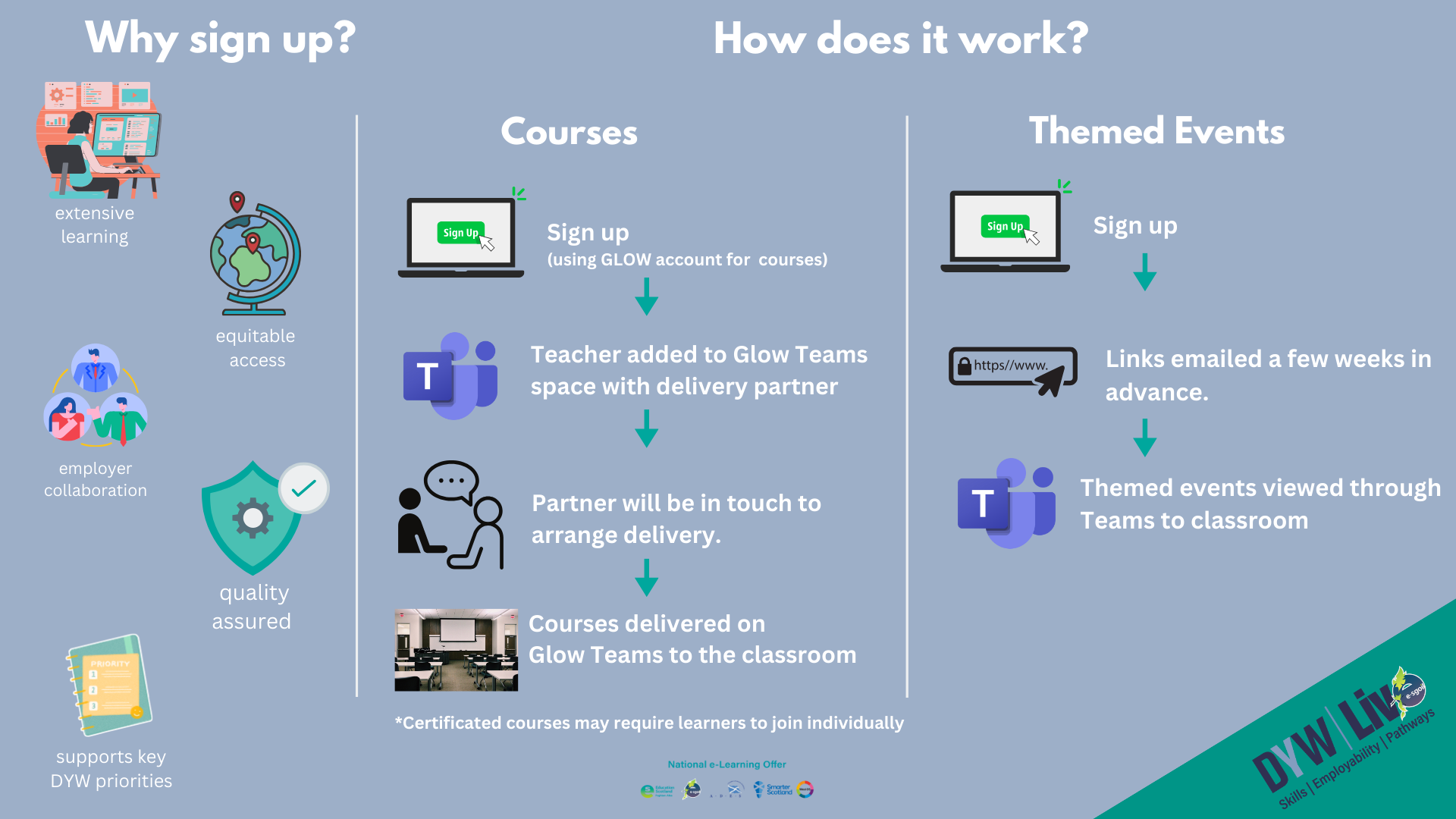Delivery Partner:
Barclays LifeSkills
| Curriculum Links: Numeracy & Mathematics |
Suitable Audience: P5, P6, P7, S1, S2, S3, S4, S5, S6 |
Start/End Dates: 2nd October 2023 - June 2024 |
Timetable Availability: Primary: Thursday's 2pm Secondary: Tuesday's 2pm and Friday's 2:30pm |
| Number of Sessions: 4 |
Session Duration: 45 minutes |
Repetition Frequency: Termly |
Max Capacity: Unlimited |
Description:
Barclays LifeSkills are excited to bring you workshops focused on core life skills via DYW Live. We have separate workshops for Primary and Secondary learners and full details of each workshop can be found below.
Primary - Session Info
The workshops aim to support primary learners with the knowledge and practical aspects related to good money management habits whilst developing core transferable skills. Our primary workshops are available as a series of four or standalone and by the end of the session, pupils will be able to...
25th April - Samir's birthday challenge –
- Understand key financial terminology
- Understand the value of money, how to manage and use money in an increasingly digital or cashless society and how to keep money safe
- Use problem solving skills to work out where the missing money may have gone
2nd May - Making the Most of Money –
- Feel confident and in control of their financial situation
- Understand why we should all be critical consumers and think carefully about how we use our money
- Understand why making informed decisions will help make the most of the money they have
9th May - Banking & Budgeting Basics –
- Understand some of the ways to manage money
- Recognise how using a bank account keeps money safe and can help them save
- Practise being responsible for managing their own money Know how to keep track of their money, and set and stick to a budget
16th May - Safe & Sensible Spending –
- Understand some of the ways to manage money
- Recognise how using a bank account keeps money safe and can help them save
- Practise being responsible for managing their own money Know how to keep track of their money, and set and stick to a budget
23rd May - Exploring Careers & Workplace Skills -
- Explore a range of jobs and sectors, and hear from different people who do them
- Match core transferable skills to different jobs
- Identify the skills they already possess, and which they could develop further
- Reflect on the best parts of different jobs and sectors, and the skills that will help
30th May - Communication -
- Define listening and speaking (communication)
- Understand how good listening and speaking(communication) skills are helpful in the world of work
- Discuss how they can show this skill at home, school or after school clubs
6th June - Strengths, Goals & Aspirations -
- Define aspirations, and recognise some of their own
- Consider what they can do to achieve their goals and aspirations
- Explore which jobs might be a good match for their skills, interests and personality
13th June - Staying Positive -
- Explain the skill of staying positive (resilience)
- Understand how staying positive (resilience) can help them throughout education and into the workplace
- Discuss how they can practice this skill at home, school or in after school clubs
The workshops are available on Thursdays at 2pm for Primary learners. There is no capacity limit on these sessions so any class/school is welcome to join pre-organised sessions and they can all be found scheduled within the delivery team.
Secondary - Session Info
Our available secondary workshops are available as a series of four or standalone and by the end of the session, students will have…
Value for money –
- Understood the difference between income and expenditure Have completed a sample budget and considered the results
- Have reflected on their own spending patterns and influences
Next steps in your financial journey –
- Considered the advantages and disadvantages of borrowing to fund a purchase
- Compared bank account features and understood how they could suit different individuals
- Learnt key terminology and interpreted a bank statement by answering questions
Money and work –
- Identified the main features of a payslip, and be able to explain some key terms
- Calculated gross and net pay accounting for a range of deductions
- Identified employee benefits beyond salary
Dealing with financial dilemmas –
- Highlighted some of the influencers on our attitudes to money and how we form good and bad habits
- Recognised common financial mistakes and threats, and understand how to improve financial health
- Understood the different ways they could be affected by fraud and how to keep financial information safe
The four workshops are available 'on demand' for Secondary learners at a time that suits your timetable, however four weeks of notice is required to get organise Barclay’s volunteers who will provide their experience and knowledge, so please book in advance. There is no capacity limit on these sessions so any class/school is welcome to join pre-organised sessions and they can all be found scheduled within the delivery team.
DYW Context:
When thinking about the world of work, money management is key to successful independent living but it is often one of the skills that is taken for granted, with assumptions made about experience and knowledge. However if students lack good money management role models, have had little to no experience on money management and are also dealing with a lot of other changes at the same time, financial capability is something that they can struggle with.
Additional Requirements:
Resources provided online via files.

Registration
CLICK HERE TO REGISTER
How DYW Live Works?:


